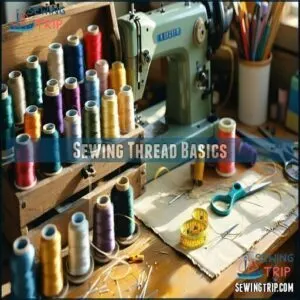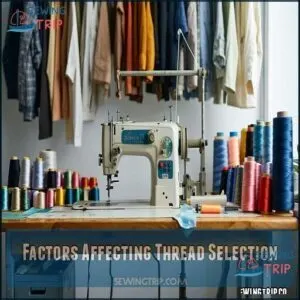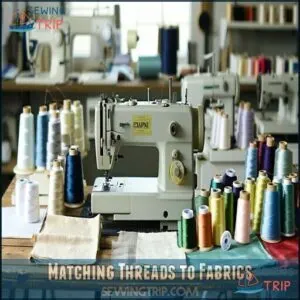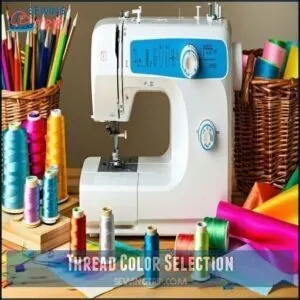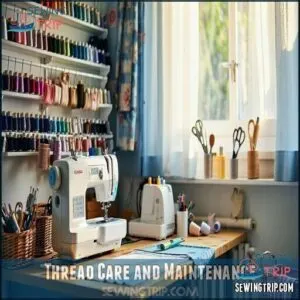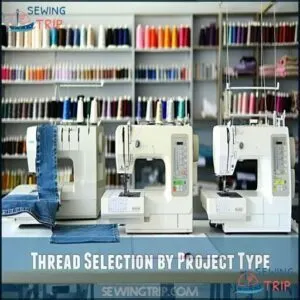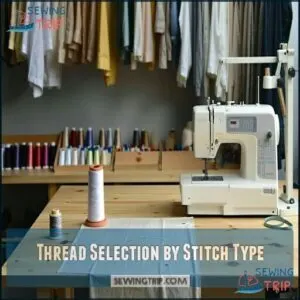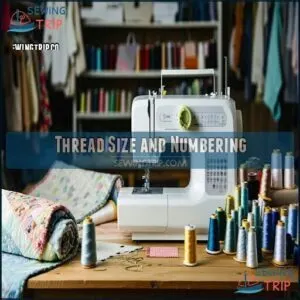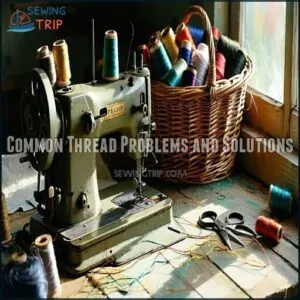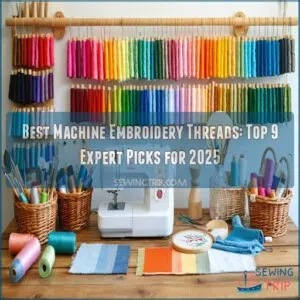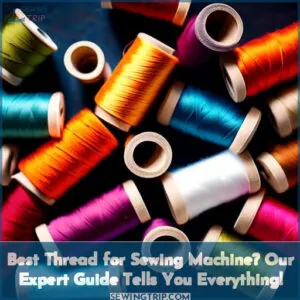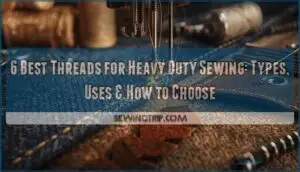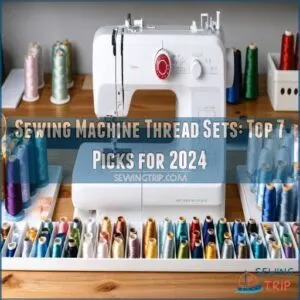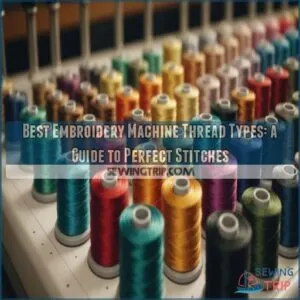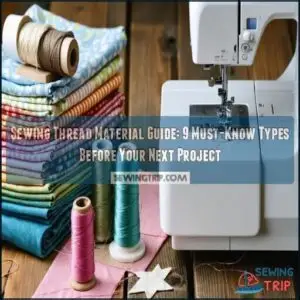This site is supported by our readers. We may earn a commission, at no cost to you, if you purchase through links.
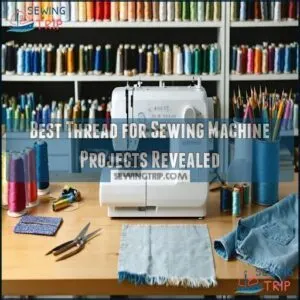
For everyday sewing, polyester thread offers outstanding durability and versatility.
Cotton thread excels with natural fabrics and quilting, while silk thread pairs perfectly with delicate materials.
Choose lighter 60wt thread for fine details and applique, or opt for sturdy 40wt thread when working with denim or upholstery.
Match your thread weight to your fabric type
Table Of Contents
- Key Takeaways
- Sewing Thread Basics
- Choosing Right Thread
- Best Thread for Sewing
- 1. Gutermann Sew All Thread Black 1094 Yards
- 2. Brothreads Polyester Embroidery Machine Thread 5000M
- 3. Dual Duty General Purpose Thread Collection
- 4. Connecting Threads 100% Cotton Thread Saltwater Taffy 1200 Yards
- 5. Dual Duty Heavy Black Thread
- 6. Natural Cream Upholstery Thread Spool
- 7. Coats Outdoor Living 200yd Buff Thread
- 8. Coats Clark Dual Duty Plus Denim Thread
- 9. Ilauke 1500M Polyester Overlock Sewing Thread 40S/2
- 10. Brothread 80 Spools Polyester Embroidery Thread Kit
- Thread Care and Maintenance
- Sewing Machine Thread Tips
- Frequently Asked Questions (FAQs)
- Conclusion
Key Takeaways
- You’ll get the best results with polyester thread for everyday sewing since it’s durable, versatile, and works well in most machines – but switch to cotton thread for quilting and natural fabrics.
- You should match your thread weight to your fabric type – use lighter 60wt thread for delicate work and applique, or choose sturdy 40wt thread for denim and upholstery projects.
- You’ll want to store your threads in a cool, dry place away from sunlight, and replace your sewing machine needle every 6-8 hours of use to prevent thread breakage and ensure smooth stitching.
- You can prevent thread bunching and tension issues by testing your stitches on scrap fabric first and adjusting your machine’s settings for each specific thread type and weight you’re using.
Sewing Thread Basics
You’ll learn about the different types of sewing threads, including their materials and origins, to help you choose the best thread for your sewing machine projects.
By understanding thread weights and sizes, you’ll be able to select the perfect thread for your specific needs and achieve high-quality results.
Types of Sewing Threads
Sewing thread types cater to every project.
Cotton thread suits natural fabrics, while silk thread glides smoothly on delicate ones.
Polyester thread offers durability, and nylon thread adds elasticity.
Metallic thread brings decorative flair.
Investing in high-quality sewing threads minimizes machine maintenance and improves stitch quality.
These sewing threads vary in weight and ply, ensuring compatibility with sewing machine threads for superior results.
Choose wisely for beautiful, lasting stitches!
Thread Materials and Origins
Thread materials vary widely, offering unique benefits for different projects.
Regular maintenance maintains peak performance, so consider these sewing machine care tips.
Common options include:
- Cotton threads: Soft, breathable, ideal for natural fabrics.
- Polyester threads: Strong, durable, and versatile.
- Silk threads: Smooth, lightweight, perfect for delicate fabrics.
- Nylon threads: Elastic, great for stretch fabrics.
- Synthetics: Combine strength and flexibility for specialized needs.
Choose materials matching your fabric for lasting results.
Thread Weights and Sizes
Understanding thread weights and sizes guarantees smoother sewing. Thread weight, measured by systems like Tex, Denier, or Ticket number, impacts stitch quality.
Lighter sewing thread weights suit delicate fabrics, while heavier threads handle thick materials. Always match thread thickness to fabric needs.
Weight selection, like 40wt for quilting or 60wt for applique, guarantees strength and aesthetic balance in your projects.
Choosing Right Thread
Choosing the right thread guarantees your sewing machine performs smoothly and produces durable, high-quality stitches.
You’ll need to evaluate factors like fabric type, thread weight, and project requirements for the best results.
Factors Affecting Thread Selection
Choosing the right thread isn’t just about color—it’s a mix of technical decisions.
Factors like thread weight and fabric type directly impact sewing thread quality.
Consider these:
- Material Choice: Match thread to fabric for durability.
- Thread Weights: Thicker threads suit heavy fabrics.
- Sewing Speed: Faster machines need stronger threads.
- Thread Tension: Adjust for smooth stitching.
- Fabric Compatibility: Pair thread type with fabric properties.
Matching Threads to Fabrics
Matching threads to fabrics is like pairing fine wine with a meal—it elevates the experience.
Cotton threads suit cotton fabrics, while polyester threads handle stretchier synthetics.
Heavier fabrics need thicker threads for durability.
Understanding cotton thread options is important for the best results.
Use this guide:
| Fabric Type | Recommended Thread | Texture Consideration |
|---|---|---|
| Cotton | Cotton Threads | Soft and natural |
| Synthetic | Polyester Threads | Strong and flexible |
| Delicate Silk | Silk Threads | Lightweight and smooth |
The key to achieving the best results is to match the thread type to the fabric, considering factors such as texture and the natural properties of the material.
By doing so, you can ensure a strong and durable finish.
Thread Color Selection
Once you’ve matched threads to fabrics, focus on thread colors.
Proper thread selection enhances your project’s finish.
Consider these tips:
- Color Matching: Match thread to fabric for a seamless look.
- Contrast Stitching: Use bold colors for standout seams.
- Decorative Color: Choose vibrant threads for embellishments.
- Thread Blending: Pick shades close to fabric tones.
- Pattern Matching: Align thread with prominent design hues.
Best Thread for Sewing
Choosing the best thread for sewing guarantees strong, smooth stitches and enhances your project’s durability.
You’ll need to match thread type, weight, and material to your fabric and machine for best results.
1. Gutermann Sew All Thread Black 1094 Yards
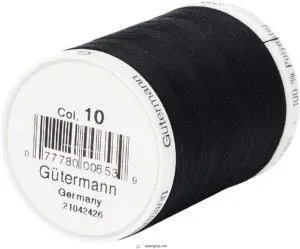
Gutermann Sew All Thread Black 1094 Yards is a must-have for versatile sewing projects.
Made from 100% long-staple polyester, it’s strong, durable, and tear-resistant, ensuring high-quality seams.
Its micro-core technology delivers smooth, tangle-free stitching, compatible with both natural and synthetic fabrics.
Perfect for hand or machine sewing, it works seamlessly in popular machines like Brother and Viking.
With minimal lint and excellent longevity, this thread handles quilting, piecing, and general sewing effortlessly, providing lasting results.
Best For: Sewing enthusiasts looking for a durable, versatile thread that works well with both hand and machine sewing on various fabrics.
- Strong and tear-resistant with smooth stitching.
- Minimal lint and long-lasting quality.
- Compatible with popular sewing machines and suitable for quilting.
- Some users report thread breakage during machine use.
- Can bunch up when sewing by hand.
- Higher price point compared to other threads.
2. Brothreads Polyester Embroidery Machine Thread 5000M
Brothreads Polyester Embroidery Machine Thread 5000M offers exceptional value and versatility for your embroidery projects.
With 100% polyester material, it’s strong, colorfast, and boasts a lustrous finish. Each spool holds 5000 meters of 40WT thread, perfect for home, semi-industrial, or commercial machines.
Its high tensile strength minimizes breakage, even at speeds of 800 stitches per minute. While a thread stand is recommended for smooth feeding, the vibrant color variety delivers stunning results.
It’s a reliable choice for both beginners and seasoned embroiderers.
Best For: Hobbyists, professionals, or businesses looking for durable, colorfast thread with a lustrous finish for embroidery projects.
- High tensile strength minimizes thread breakage.
- Vibrant color variety for versatile embroidery designs.
- Compatible with multiple machine types, from home to commercial.
- Requires a thread stand for smoother feeding on home machines.
- Slightly lower strength in some colors due to dyeing process.
- Slower stitching speed needed for certain colors.
3. Dual Duty General Purpose Thread Collection
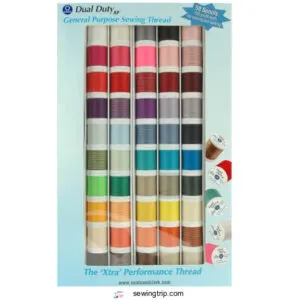
If you’re after versatility and quality, the Dual Duty General Purpose Thread Collection delivers.
With 50 spools of polyester-wrapped core-spun thread, it’s strong, smooth, and perfect for hand or machine sewing.
Whether you’re stitching knits, wovens, or mixed fibers, this medium-weight thread guarantees consistent tension and durable seams.
Packaged in a sleek box with secure “snap trap” spool tops, it’s practical and organized, plus, the vibrant color variety makes it a go-to for countless projects, from repairs to creative designs.
Best For: Hobbyists, crafters, and sewists looking for durable, versatile thread with a wide color selection for various projects.
- May not be ideal for heavy-duty or industrial sewing projects.
- Limited to medium-weight thread, which might not suit all fabric types.
- Larger collection size may be excessive for occasional or minimal sewing needs.
- Includes 50 spools with vibrant color variety for creative flexibility.
- Strong, smooth polyester-wrapped core-spun thread ensures consistent tension and durability.
- Comes in a sturdy, reusable box with secure spool tops for organized storage.
4. Connecting Threads 100% Cotton Thread Saltwater Taffy 1200 Yards
The 100% Cotton Thread in Saltwater Taffy offers 1,200 yards of smooth, versatile stitching power. Its 50-weight, three-ply construction guarantees durability and precision, making it perfect for quilting or general sewing.
The satin finish reduces lint buildup, keeping your sewing machine running smoothly. With assorted vibrant colors, this thread fits standard spindles and suits beginners and professionals alike.
Crafted from extra-long staple cotton, it delivers consistent results while enhancing project quality. Whether piecing quilts or sewing garments, this thread guarantees reliability and a polished finish.
Best For: Quilters and sewists of all skill levels looking for durable, smooth, and vibrant thread for various projects.
- Limited to standard spindle compatibility.
- May not suit heavy-duty or outdoor fabric projects.
- Assorted colors may not match specific project needs.
- Durable 50-weight, three-ply construction for precision stitching.
- Satin finish minimizes lint and keeps machines running smoothly.
- Vibrant assorted colors suitable for quilting and general sewing.
5. Dual Duty Heavy Black Thread
For heavy-duty sewing, Dual Duty Heavy Black Thread is your go-to option.
Made of 100% polyester, it’s tough enough for denim, double knits, and even drapery fabrics.
Its smooth finish and balanced twist guarantee consistent stitches, while its colorfast and weather-resistant properties make it reliable for outdoor projects.
Pair it with machine needles (14-18) or hand needles (sizes 1-6) for bold topstitching or buttonhole sewing.
The spool’s clever pop-out mechanism keeps unused thread secure, making your sewing experience seamless and frustration-free.
Best For: Heavy-duty sewing enthusiasts working with tough fabrics like denim, knits, or outdoor materials.
- Limited to black color, restricting design flexibility.
- Not ideal for lightweight or delicate fabrics.
- May require specific needle sizes for optimal performance.
- Durable, weather-resistant, and colorfast for reliable outdoor use.
- Smooth finish and balanced twist ensure consistent stitches.
- Pop-out spool mechanism keeps unused thread secure.
6. Natural Cream Upholstery Thread Spool
The Natural Cream Upholstery Thread Spool is a powerhouse for heavy-duty sewing projects.
Its durable, weather-resistant design makes it perfect for upholstery, carpet repairs, and even crafting sturdy hair bows.
Customers rave about its smooth handling, reporting no needle jams or thread breakage.
This UV-resistant thread works seamlessly with heavyweight fabrics, ensuring long-lasting results.
Whether you’re reupholstering a chair or sewing pointe shoe ribbons, this thread delivers consistent tension and reliable performance.
It’s an excellent value, making tough sewing tasks less stressful.
When selecting threads, considering the thread weight factors is important for achieving professional-looking results.
Best For: Those tackling heavy-duty sewing projects like upholstery, carpet repairs, and crafting durable items.
- Requires increased stitch length for optimal results.
- Limited to heavyweight applications, not ideal for delicate fabrics.
- May not match all color needs despite multiple options available.
- Weather-resistant and UV-resistant for outdoor and indoor use.
- Smooth handling with minimal tangling or needle jams.
- Strong and durable, suitable for heavyweight fabrics.
7. Coats Outdoor Living 200yd Buff Thread
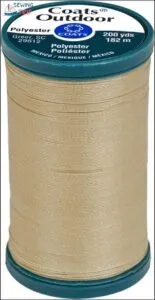
The Coats Outdoor Living 200yd Buff Thread is a powerhouse for outdoor sewing projects.
Its polyester composition maintains durability against weather conditions, making it ideal for patio furniture, awnings, or waterproof materials.
This strong, thick thread works seamlessly with standard sewing machines, providing reliable results without frequent breakage.
While it’s slightly pricier, its resilience justifies the cost for long-lasting outdoor use.
Pair with heavy-duty fabrics for ideal performance, and you’ll appreciate its strength and versatility in demanding applications.
Best For: outdoor enthusiasts and sewers who need a durable thread for projects like patio furniture, awnings, or waterproof materials.
- Strong and thick thread that works well with standard sewing machines
- Resilient and durable against weather conditions, making it ideal for long-lasting outdoor use
- Suitable for heavy-duty fabrics and demanding applications
- May tangle, but can be easily remedied
- Pricier than other thread options
- Not suitable for delicate or indoor projects that require a softer thread
8. Coats Clark Dual Duty Plus Denim Thread
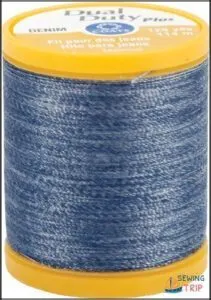
When sewing denim, you’ll find Coats Clark Dual Duty Plus Denim Thread is a great choice.
This cotton-covered polyester thread blends seamlessly with denim and is strong enough for repairs.
Its smaller spool size is convenient for mending and sashiko patches, making it a practical option for your sewing projects.
Best For: people who need a strong and durable thread for sewing and repairing denim fabrics, especially for mending, sashiko patches, and other small projects.
- Strong and durable thread suitable for repairs
- Blends seamlessly with denim for a natural look
- Convenient smaller spool size for mending and small projects
- Smaller spool size may not be suitable for large projects
- Limited to denim and similar fabrics
- May not be the best choice for heavy-duty or industrial sewing projects
9. Ilauke 1500M Polyester Overlock Sewing Thread 40S/2
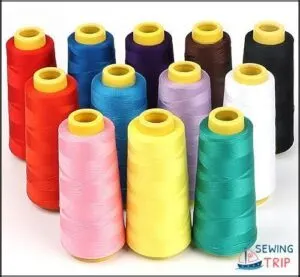
You’re looking for a reliable thread for your overlock sewing projects.
Ilauke’s 1500M Polyester Overlock Sewing Thread 40S/2 is a great option, offering softness, strength, and durability.
It’s suitable for serger, quilting, and general stitching, making it a practical choice for various projects, with 12 colors available and a total of 18000 meters of thread, which provides durability.
Best For: Ilauke’s 1500M Polyester Overlock Sewing Thread 40S/2 is best for sewers and crafters who need a reliable and durable thread for their overlock sewing projects, including serger, quilting, and general stitching.
- Soft and smooth with high strength, making it suitable for various sewing projects
- Durable and strong, with a total of 18000 meters of thread available in 12 colors
- Practical for backup use and convenient sewing experience, with good quality and accurate colors
- Thread breaks easily and produces lint on regular sewing machines, which can be frustrating for users
- Spools are smaller than expected, with only 1500M of thread per spool, which may require multiple purchases
- Some users report thread strength issues and box damage, which can affect the overall quality of the product
10. Brothread 80 Spools Polyester Embroidery Thread Kit
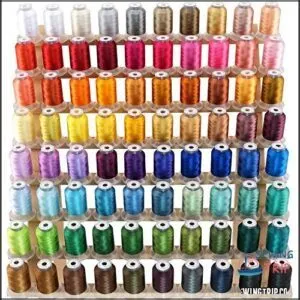
This extensive 80-spool embroidery thread kit delivers exceptional versatility for your machine embroidery projects.
You’ll find 78 vibrant colors plus two extra spools each of white and black. The 40-weight polyester threads run 500 meters per spool, offering impressive tensile strength and minimal fraying.
Compatible with Janome and other major brands, these threads boast excellent colorfastness and a glossy finish that’ll make your designs pop.
While they’re perfect for machine embroidery, note they’re not ideal for hand sewing or buttonholes. Conversion charts for Robison-Anton colors come included, providing additional convenience.
Best For: Machine embroidery enthusiasts seeking a comprehensive color selection for diverse projects with Janome and other major brand machines.
- Extensive kit with 78 unique colors plus extra white and black spools provides exceptional variety for complex designs and multiple projects
- High-quality 40-weight polyester thread offers excellent tensile strength and resistance to fraying during machine use
- Includes color conversion charts for Robison-Anton threads and features good colorfastness for wash-resistant results
- Not well-suited for hand sewing or buttonhole applications
- Does not include a storage rack for organization
- May be more colors than needed for casual or occasional embroiderers
Thread Care and Maintenance
You’ll need to protect your thread investment by storing spools in a cool, dry place away from direct sunlight and dust.
Your sewing machine’s performance directly depends on proper thread maintenance, including regular cleaning of the bobbin area and correct tension adjustments, which is crucial for optimal sewing machine’s performance.
Proper Thread Storage
In a cool, dry place, your sewing threads deserve a proper home.
Keep them organized in labeled spools away from direct sunlight to prevent fading and brittleness.
For effective organization, consider pegboard thread storage systems.
You’ll want dedicated storage containers that prevent dust accumulation while maintaining thread quality.
Clear organizers help you spot the right color instantly, while drawer dividers keep your sewing machine thread collection neatly sorted and ready for your next project.
Thread Breakage and Troubleshooting
Many frustrating thread breakage issues stem from incorrect thread tension or weak fibers.
When your sewing machine threads snap mid-project, check if the tension’s too tight or if fraying issues are present.
Common breakage causes include dull needles, poor-quality thread, or mismatched thread weights.
To boost thread durability and prevent snaps, use fresh, quality threads and verify proper tension settings for your specific project, ensuring thread durability.
Regular Sewing Machine Maintenance
To keep your sewing machine running smoothly with any thread type, stick to a regular maintenance schedule.
Clean out lint from the bobbin area after each project, perform monthly oil checks, and adjust tension settings when switching thread weights.
Replace needles every 6-8 hours to prevent thread breakage issues.
Remember, proper machine cleaning and thread maintenance maintain consistent stitching quality.
Sewing Machine Thread Tips
You’ll find that selecting the right thread for your sewing machine projects makes a significant difference in the final results and durability of your work.
Whether you’re stitching lightweight cotton or heavy denim, understanding thread weights, sizes, and types will help you achieve professional-looking seams and prevent frustrating thread breakage.
Thread Selection by Project Type
Selecting the right thread for your sewing machine project is like choosing the perfect dance partner – it needs to match your fabric’s moves perfectly.
Your thread selection impacts durability and appearance, making it essential for project success.
- Heavy-duty polyester threads (40wt) work best for denim and upholstery projects, providing strength for high-stress areas
- Cotton threads (50wt) shine in quilting and delicate work, offering superior stitch definition
- Specialty threads like metallic or elastic varieties add unique flair to decorative projects
The quality of sewing machine thread can substantially affect the overall outcome of a sewing project.
Thread Selection by Stitch Type
Your stitch type directly impacts your thread selection choices.
For basting work, you’ll want thinner threads that break easily, while top stitching demands smoother, thicker options for that professional finish.
When you’re working with decorative stitches, opt for threads that glide smoothly through your machine.
For stretchy fabrics, elastic thread provides the flexibility you need, while hand quilting benefits from specially coated threads that move effortlessly through layers.
Thread Size and Numbering
Thread numbers might look like a secret code at first, but they’re actually pretty straightforward.
Your thread weight number tells you how thick it’s – the lower the number, the thicker the yarn thickness.
For example, a 30-weight thread is thicker than a 50-weight.
Most sewing machines work best with 40-50 weight threads, while hand quilting often calls for thicker 30-weight options.
Understanding thread weight systems is essential for selecting the right thread for your sewing projects.
Common Thread Problems and Solutions
You’ll encounter sewing hiccups, but don’t let thread breakage or tension issues derail your project.
When your thread tangles, clean your machine’s tension discs and check the threading path. For knot removal, snip carefully and rethread.
To prevent fraying issues, use high-quality thread and maintain proper tension settings. If snags appear, slow down your sewing speed and make sure your needle’s in good condition.
Understanding thread breakage causes is important for troubleshooting common sewing problems and ensuring proper tension settings.
Frequently Asked Questions (FAQs)
What is the best thread to use for a sewing machine?
Like a trusty sidekick on your sewing journey, you’ll want polyester all-purpose thread for your machine. It’s strong, versatile, and won’t let you down across most projects you’re tackling.
What type of thread will you need for most sewing projects?
You’ll need an all-purpose polyester thread for most projects. It’s durable, versatile, and works well in any machine. For delicate fabrics, consider using cotton or silk threads instead.
Is cotton or polyester thread better for a sewing machine?
Polyester thread offers superior strength and versatility for your sewing machine projects.
While cotton’s great for natural fabrics, you’ll find polyester resists stretching better and won’t break as easily during machine stitching, which makes it a great choice for projects that require versatility.
What is the most durable thread for sewing?
Hard as nails, nylon thread’s tensile strength makes it your top choice for durability.
You’ll find it’s perfect for heavy-duty projects, while polyester thread comes in as a close second for long-lasting performance.
How often should I replace my sewing machine needle?
You’ll want to change your sewing machine needle after 6-8 hours of sewing time or every 2-3 projects.
If you notice skipped stitches or fabric snags, it’s time for a new needle.
Can thread tension affect seam puckering?
Like a tightrope walker seeking perfect balance, your thread tension directly impacts seam puckering.
When tension’s too tight or loose, you’ll see unwanted waves and puckers in your seams.
Adjust accordingly for smooth results.
Why does my thread keep shredding during zigzag stitches?
Your thread might shredding during zigzag stitches due to incorrect needle size, dull needles, or mismatched thread weight.
Check your machine’s tension settings and make sure you’re using quality thread suited for decorative stitching, and also ensure that you are using the correct settings to avoid issues.
Should I pre-wind multiple bobbins before starting projects?
You’ll save precious time by pre-winding several bobbins before starting. It’s especially helpful when working with multiple colors or large projects. Just store them properly to prevent unwinding and tangling.
What causes thread bunching on fabrics underside?
Just as dancers need perfect timing, your machine needs proper tension balance.
You’ll see bunching when upper tension’s too loose or bobbin tension’s too tight.
Check both settings to restore smooth stitching.
Conclusion
Selecting the best thread for sewing machine projects doesn’t have to be a puzzle.
You’ll achieve professional results by matching thread type, weight, and color to your specific project needs.
Remember that polyester thread works well for everyday sewing, while cotton excels in quilting and natural fabrics.
Keep a variety of threads in your sewing kit, maintain proper tension settings, and always test on scrap fabric first.
With these guidelines, you’re ready to tackle any sewing project confidently.

